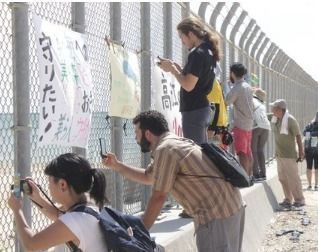Young attendees to the 6th Worldwide Uchinanchu Festival visit and study Henoko and Takae

Participants in the tour to Henoko and Takae look on and take pictures through the fence of Camp Schwab on October 24 at the beach in Henoko.
October 25, 2016 Ryukyu Shimpo
On October 24, young people of Okinawan heritage in their 20s and 30s from countries around the world visited places shaken by military base issues, namely the ocean at Henoko and the woods in Takae, prior to the opening of the 6th Worldwide Uchinanchu Festival on October 27. These participants shared thoughts such as, “resistance is essential after all,” “the existence of the bases is a problem which affects people’s lives,” and “I also wanted to hear the thoughts of people who accept [the bases].” Linked to the festival, the bus tour Yuntaku Bus 2016 via Takae and Henoko took about 20 participants including 13 from North and South America to view these areas.
At the beach in Henoko, participants listened to co-representative of the Helicopter Base Objection Association Hiroshi Ashitomi’s explanation, and gazed with great interest toward the fence that separates Camp Schwab from civilian soil.
Satomi Karina Matsumoto is a 27-year-old 3rd generation Okinawan from Brazil who also visited Henoko during her introductory period to the festival in 2013. She thinks as a method for stopping construction “resistance is essential after all.” Although in Brazil police will use rubber bullets and tear gas on citizens’ demonstrations, she says that, “[Japanese riot police officers] only laid hands [on citizens], but the violence is no different.”
Jeff Tanaka is a 27-year-old 4th generation Okinawan who was born in the United States and resides in Canada. Alluding to Okinawa’s Japan- and U.S.-dictated history he says that the way people who have lived on that land for a long time are being pushed off resembles the issues that Canada’s indigenous people face. He went on to say that those who retain Okinawa’s language, land, and culture will become Okinawa’s hope.
Harold Mariano Kazuo is a 35-year-old 3rd generation Okinawan from Argentina, with roots to the northern part of Okinawa Island on both his father’s and mother’s side of the family. He was also looking forward to asking for those who reluctantly accept the military bases to share their thoughts, but there was not enough time. Along the lines of bases affecting human lives, he goes on to say that, “There nothing worth protecting to the point of sacrificing lives.”
Lima Tokumori, a 29-year-old on the committee for the Yuntaku Bus tour, said about the experience, “It is not about asking [others if they] accept military base problems or not, it’s about seeing and hearing about the actual sites, and creating an opportunity to have people consider [these situations].”
(English translation by T&CT and Erin Jones)
Previous Article:Hawaii’s Ige tells Onaga he is inspired by great participation from abroad in Uchinanchu Festival
Next Article:Rainbow in night sky drawing arch of happiness captured in Ishigaki
[Similar Articles]
- The World Youth Uchinanchu Festival held in Germany
- Okinawa Junior Study Tour – children of Okinawan immigrants learn about Okinawa
- NGO members and researchers from various countries visit Okinawa to learn about base issues
- 5th Worldwide Uchinanchu Festival attracts a record 7363 participants from outside Okinawa, including 5317 from abroad
- Shurijo Castle Festival: Tsuha and Higa elected for the roles of King and Queen
 Webcam(Kokusai Street)
Webcam(Kokusai Street)


